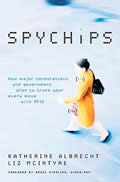Other
McIntyre
Articles:
Coming Soon
TWO U.S. COMPANY EMPLOYEES INJECTED WITH RFID MICROCHIPS
By Liz McIntyre & Katherine Albrecht
February
10, 2006
NewsWithViews.com
Cincinnati video surveillance company CityWatcher.com now requires employees to use VeriChip human implantable microchips to enter a secure data center, Network Administrator Khary Williams told Liz McIntyre by phone yesterday. McIntyre, co-author of "Spychips: How Major Corporations and Government Plan to Track Your Every Move with RFID," contacted CityWatcher after it announced it had integrated the VeriChip VeriGuard product into its access control system.
The VeriChip is a glass encapsulated RFID tag that is injected into the flesh of the triceps area of the arm to uniquely number and identify individuals. The tag can be read through a person's clothing, silently and invisibly, by radio waves from a few inches away. The highly controversial device is being marketed as a way to access secure areas, link to medical records, and serve as a payment instrument when associated with a credit card.
According to Williams, a local doctor has already implanted two of CityWatcher's employees with the VeriChip devices. "I will eventually" receive an implant, too, he added. In the meantime, Williams accesses the data center with a VeriChip implant housed in a heart-shaped plastic casing that hangs from his keychain. He told McIntyre he had no qualms about undergoing the implantation procedure himself, and said he would receive an implant as soon as time permits.
"lt worries us that a government contractor that specializes in surveillance projects would be the first to publicly incorporate this technology in the workplace," said McIntyre. CityWatcher provides video surveillance, monitoring and video storage for government and businesses, with cameras set up on public streets throughout Cincinatti.
The company hopes the VeriChip will beef up its proximity or "prox" card security system that controls access to the room where the video footage is stored, said Gary Retherford of Six Sigma Security, Inc., the company that provided the VeriChip technology. "The prox card is a system that can be compromised," said Retherford, referring to the card's well-known vulnerability to hackers. He explained that chipping employees "was a move to increase the layer of security....It was attractive because it could be integrated with the existing system."
Ironically, implantable tags may not provide CityWatcher with that additional safety, after all. Last month security researcher Jonathan Westhues demonstrated how the VeriChip can be skmmed and cloned by a hacker, who could theoretically duplicate an individual's VeriChip implant to access a secure area. Westhues, author of a chapter titled "Hacking the Prox Card" for Simson Garfinkel's recent "RFID: Applications, Security, and Privacy," said the VeriChip "is not good for anything" and has absolutely no security.
"No one I spoke with at Six Sigma Security or at CityWatcher knew that the VeriChip had been hacked," McIntyre observed. "They were also surprised to hear of VeriChip's downsides as a medical device. It was clear they weren't aware of some of the controversy surrounding the implant."
Although CityWatcher reportedly does not require its employees to take an implant to keep their jobs, Katherine Albrecht, "Spychips" co-author and outspoken critic of the VeriChip, says the chipping sets an unsettling precedent. "It's wrong to link a person's paycheck with getting an implant," she said. "Once people begin 'voluntarily' getting chipped to perform their job duties, it won't be long before pressure gets applied to those who refuse."
Albrecht predicts that news of the security flaws will combine with public squeamishness to make the VeriChip a hard product to sell, however. "Obviously, nobody wants their employer coming at them with a giant hypodermic needle. But when people realize it takes a scalpel and surgery to remove the device if it gets hacked, they'll really think twice," she said. "An implant is disgusting enough going in, but getting it out again is a bloody mess."
Albrecht and McIntyre, who are Christians, also have religious concerns about RFID chip implants. In their latest book, "The Spychips Threat: Why Christians Should Resist RFID and Electronic Surveillance," the pair explain how plans by global corporations and government entities to broadly deploy RFID could usher in a world that bears a striking resemblance to the one predicted in Revelation, the last book of the Bible.
According to Revelation, at some future point people will not be able to buy or sell unless they are numbered and bear a mark on their hand or forehead.
"While Christians have theological reasons to reject being uniquely numbered, this is an issue that should concern anyone who values privacy and civil liberties," said Albrecht. "The VeriChip is Big Brother technology being unscrupulously marketed by a company that would like to put a chip in every one of us. It has no place on free American soil."
� 2006 - Liz McIntyre - All Rights Reserved
Sign Up For Free E-Mail Alerts
E-Mails are used strictly for NWVs alerts, not for sale
Liz McIntyre is a consumer privacy expert and author of Spychips: How Major Corporations and Government Plan to Track your Every Move with RFID. In this explosive book, McIntyre and co-author Katherine Albrecht reveal how organizations like Procter & Gamble, Gillette, Wal-Mart, and even the U.S. Postal Service plan to use tiny computer chips smaller than a grain of sand to track everyday objects-and even people-keeping tabs on everything you own and everywhere you go.
Katherine Albrecht is a privacy advocate and co-author of Spychips: How Major Corporations and Government Plan to Track your Every Move with RFID. Albrecht has testified on RFID technology before the Federal Trade Commission, the California state legislature, the European Commission, and the Federal Reserve Bank, and she has given over a thousand television, radio and print interviews to news outlets all over the world. Her efforts have been featured on CNN, NPR, the CBS Evening News, Business Week, and the London Times, to name just a few.
Web Sites: SpyChips.com and NoCards.org
E-Mail: liz@spychips.com
According to Williams, a local doctor has already implanted two of CityWatcher's employees with the VeriChip devices. "I will eventually" receive an implant, too, he added.














